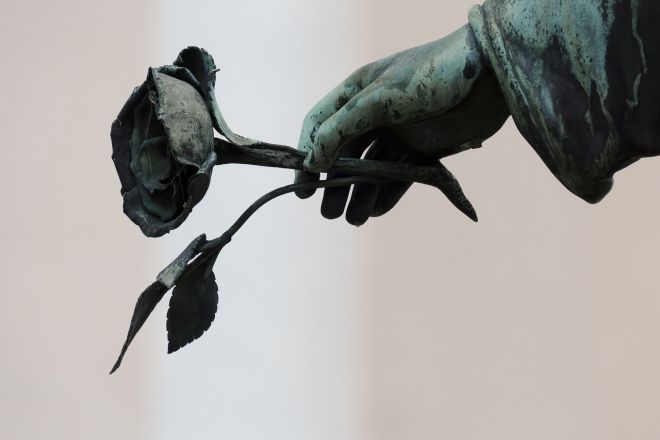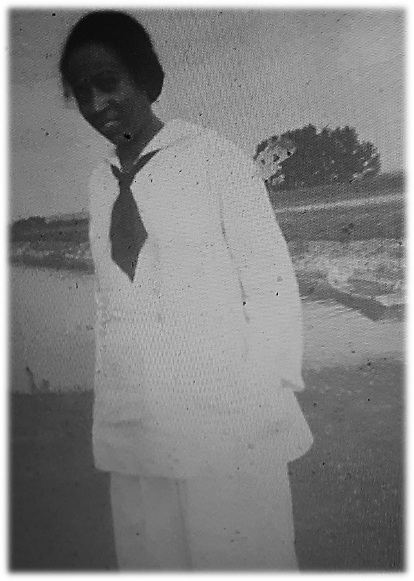Remembering Caroline Peery: 1894–2000
Published on January, 34 2024
By Claudia Fatimah Peery Smith
February 2024
Caroline Watson Peery, my grandmother, dedicated her entire life to the pursuit of peace, freedom and social equality. She did so as a life-long member of the Women’s International League for Peace and Freedom (WILPF). Caroline was born to David Watson and the former Molly Watkins in Oswego, Kansas in 1894. Both of her parents were the children of enslaved Africans.
When I was a child, grandma Caroline used to tell me about how she used to rub the scars on her, once enslaved, grandmother’s back. Those healed over wounds were a painful reminder of the beatings her grandmother endured before the Emancipation Proclamation ended Black bondage in the USA. Caroline herself came of age when legalized Jim Crow racial segregation ruled the South and unwritten racial discrimination practices were rampant in the North. Grandma Caroline told me that she was greatly inspired by her childhood encounters with some resilient, still surviving, former slaves. She said that the life stories those elders shared, “Filled her heart with hope for a better future.”
Only Black Student In Her Class
 In 1914, at the age of 20, Caroline entered Drake college in Des Moines, Iowa to become a teacher. She was the only Black student in her class which was not a socially comfortable situation back then. But grandma Caroline refused to let racism, prejudice and discriminatory treatment stop her. She chose to become an educator during a historical period when 90% of the USA’s enslaved African descendant population still resided in the Southern states. It was a time when the Jim Crow South’s discriminatory practices made it extremely difficult for the newly freed slaves to obtain any formal schooling.
In 1914, at the age of 20, Caroline entered Drake college in Des Moines, Iowa to become a teacher. She was the only Black student in her class which was not a socially comfortable situation back then. But grandma Caroline refused to let racism, prejudice and discriminatory treatment stop her. She chose to become an educator during a historical period when 90% of the USA’s enslaved African descendant population still resided in the Southern states. It was a time when the Jim Crow South’s discriminatory practices made it extremely difficult for the newly freed slaves to obtain any formal schooling.
She decided to become part of the American Missionary Society’s efforts to provide formal educational opportunities for African American children in the Southern states. The American Missionary Society initially sent Caroline to teach and assist with the development of a school for Black children at Mound Bayou, Mississippi. She was later reassigned to another school for the children of formerly enslaved Black people in Albany, Georgia. It was not unusual for resentful racists to burn the South’s independent Black schools to the ground back then, and they occasionally lynched the teachers. But that did not stop grandma Caroline either.
Sharing knowledge and elevating the consciousness of others was a way of life with grandma Caroline. She never thought of teaching as a mere job. In her mind, educating yourself, and then teaching others was a moral-spiritual mission for visionary thinkers. She believed that the preservation of human civilization calls for the presence of a skilled and knowledgeable society of people. In her mind, ignorance was the main ingredient needed for hostile racist behavior.
No Longer Allowed to Teach Once Married
However, her employment as a schoolteacher ended when she married Benjamin Franklin Peery in the 1920s. Early 20th century school systems required all female school teachers to give up their profession once they decided to start their own families. Consequently, her experience with gender-based discrimination motivated grandma Caroline to not only speak out against racism, but sexism, as well. She openly and unapologetically upheld the right of both women and the descendants of African slaves to vote.
Caroline and Benjamin Peery raised seven sons, five of whom served in the USA’s military branches. Grandma was gravely concerned about the number of lives lost during combat in World War II (1941–1945). Like most other war time mothers, she constantly worried about the fate of her soldier sons. Furthermore, the new reality of mass destructive nuclear warfare made her fearful for the future of all humanity.
Renewed Activism
The years that followed were a period of renewed activism for the maturing, now empty nested, grandma Caroline. Sometimes, she took me with her to participate in non-violent protests on behalf of civil rights and world peace. She was not afraid to personally confront individual citizens, journalists, preachers, her local elected officials and even congressional representatives about the need to eliminate the USA’s social ills. She challenged people in power quietly, but face to face, about the evils of nuclear war, poverty, racial hatred and illiteracy.
My aging grandma Caroline once told me that she managed to get a private interview with the then young and rising Reverend Martin Luther King, Jr. She described the 15 minutes that she was able to spend with him as “priceless moments.” Caroline prioritized the importance of arming the nation’s younger people with the leadership skills that are needed to govern a humane and progressive society. She admired Dr. King for his courageous leadership for the rest of her life.
Caroline clung to the principles of non-violence and peaceful reconciliation at a time when race riots were exploding everywhere in Black urban America (1963–1969). Yet, in the midst of all that social change chaos, grandma Caroline made a beyond idealistic and optimistic prediction for the future. She said, “One day the nations of the world will learn to come together, talk to each other, and reason out their differences. When that day comes, there will be no more wars.”
Caroline had the rare opportunity to experience life in three different centuries. Even more remarkable is the fact that she never abandoned her belief that humanity can create a harmonious and productive world. She remained an advocate for human equality, peace and freedom until she passed away in the year 2000 at the age of 106. Caroline Watson Peery was a resolute Women’s International League for Peace and Freedom pioneer and an unsung national treasure who must never be forgotten.



